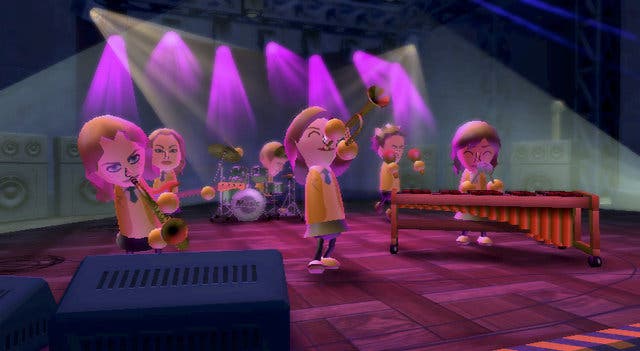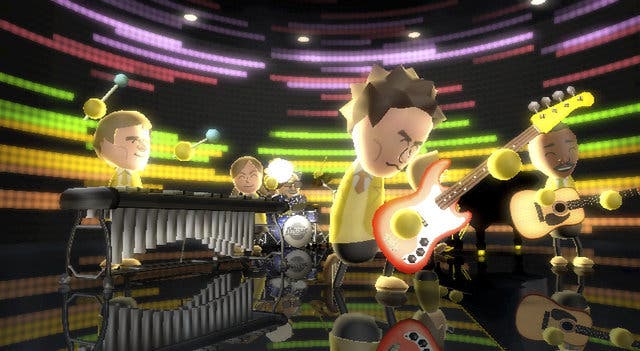Wii Music
Out of tune.
There are always the mini-games to keep you entertained. But not for long, as there are only three of them. Mii Maestro involves waving the remote around to conduct a virtual orchestra - or in practice, to choose the speed they play at. Clarissa found it to be "a bit clunky" and "still just about rhythm, not about conducting". Jake liked it, and saw potential for a useful composing tool ("If I could record a piece of music, then control the tempo intuitively by waving my arms about, that could be genuinely useful.") I thought it was dull and rubbish.
Handbell Harmony is the closest Wii Music ever gets to being a videogame, and the most fun thing in it. Different coloured bells scroll across the screen, and you wave the appropriate controller when your colours reach the marker. It's Guitar Hero for simpletons and small children, in other words, and it's surprisingly enjoyable - especially with two or more players. Unfortunately there's only a handful of tunes to play through.
Pitch Perfect is the most educational of the mini-games. You're given tasks like picking two Miis playing the same note from a group of four, or determining which Mii is playing the wrong note. Some of these tasks are tediously easy while others are tricky even for grown-ups, and they seem to be bundled together in any-old order.
According to Clarissa there's some value here when it comes to learning about how music works, but once again, there are limitations. "This could be a good way to get thinking about high and low pitches and their relationships," she said. "But there's a strange incongruity where it uses musical jargon - words like pitch and harmony - without explaining what they mean. So a kid couldn't just play by themselves and suddenly have an understanding of those things."
Jake added, "It's quite advanced music theory, in a way - you're learning about pitch, intervals, chords, notes and stuff. What would it cost to put up a bit of blurb at the end of each task, explaining what you've just learned?"

Not very much, is the answer. Which brings us to one of the most fundamental problems with Wii Music: value for money. The full RRP is GBP 34.99. Yes, you can already find it online for GBP 29.99, but even that's pushing it.
There's an awful lot of fluff and polish here. The visuals are stylised, cute and occasionally charming in that Nintendo way (although the Tutes are a total rip-off of the Muppets). You can design your own album covers using your Miis and a limited selection of templates. You can share music videos over the internet. You can play with just remotes if you don't have enough nunchuks, and use the Balance Board as a drum pedal.
But these are all throwaway extras. They don't make up for the fact you've got a pretty limited selection of songs to choose from, many of them rubbish, and no promise of downloadable tracks in the future. Nor for the fact there are only three mini-games, and only one of them is any good. Nor for the fact that while Wii Music makes some pretense of teaching musical theory, it doesn't do so very well. In short, the novelty of banging away on different virtual instruments wears off quickly, and when it does there's not much left at the core.

It's not only unclear what Wii Music is, but who it's aimed at. It's certainly not for Nintendo's platforming hardcore, though that's not a reason to condemn it. It's not challenging or sophisticated enough to appeal to adults who want to improve their musical skills. Meanwhile, some of the lessons, mini-games and concepts presented are too complex for younger children, and too tedious for older ones. So who is Wii Music for?
Perhaps Jake had the answer. "It's for middle-class parents," he argued. "It's so they can say, 'Well, we got a Wii, because at least they're moving about a bit, and we got Wii Music, because at least they're learning some musical skills.' It's misguided, and it's pointless. 'Darling, darling, why don't you play Wii Music?' 'No, because I'd rather drive a car around. Or shoot things.'" He and I are both the children of middle-class parents, and as he pointed out, aged 9, we'd probably have played Wii Music for an hour, then gone back to Super Mario Kart.
Not all videogames have to be about cars or guns, and I don't believe every piece of console software should have to be a videogame. I do think software should be entertaining, or educational, or preferably both. Wii Music isn't very entertaining and it's not very educational. There aren't enough goals for it to work as a game, and there's not enough musicality for it to work as a toy. It's not clear what it is or who it's for. One thing's for sure: it's not worth forty quid.









